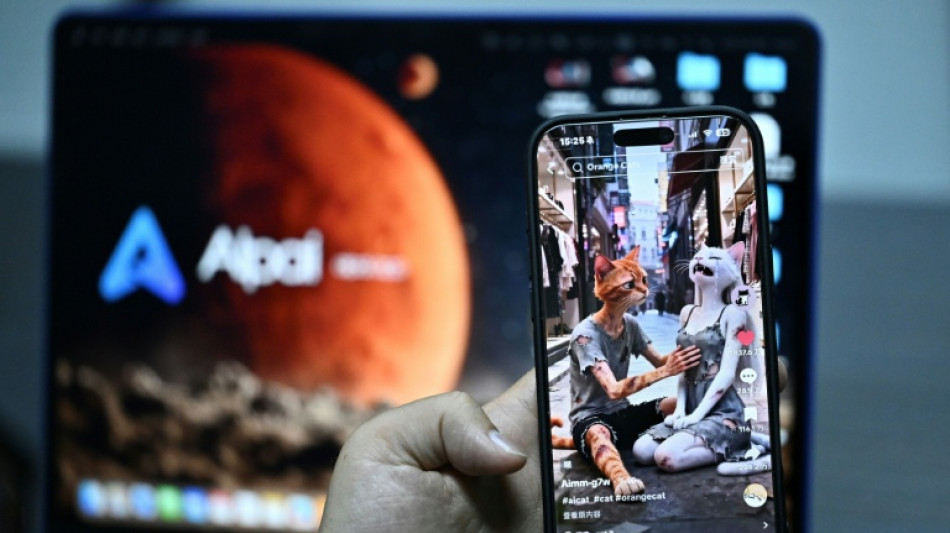
Chinese microdrama creators turn to AI despite job loss concerns

Ultra-short video series "Strange Mirror of Mountains and Seas" is filled with dragon-like monsters, handsome protagonists and plenty of melodrama -- almost all of it, including the lifelike human characters, created by artificial intelligence.
With over 50 million views, it is one of a growing number of AI-generated "microdramas", soap opera-like series with episodes as short as 30 seconds, that are taking China by storm.
Microdrama production companies are increasingly harnessing AI to replace actors and screenwriters with algorithms, raising concerns about job losses and copyright infringement that have riled creative industries globally.
Chen Kun, the creator of "Strange Mirror of Mountains and Seas", told AFP microdramas are ideal candidates for AI disruption because viewers -- typically watching on phone screens while commuting or at work -- tend to miss visual discrepancies created by the still-fledgling technology.
"Even if AI can't achieve the production values of traditional filmmaking today, it can meet the needs of microdramas as a first step," said Chen.
Chinese audiences are lapping them up.
"Nine-tailed Fox Demon Falls in Love with Me", an AI microdrama with fever dream-like visuals and a nonsensical plot, went viral recently.
"If you're just watching without using your brain, you can ignore some illogical details in the visuals," a fan of the show told AFP on video app Douyin, providing only the username "Tiger Mum".
Chen used various AI platforms for his series, including ChatGPT for the screenplay, Midjourney to generate still images, China's Kling to turn images into video, and Suno for the soundtrack.
Onlythe editing and voice acting were done by humans.
"Many special effects can be created (using AI), though there are indeed issues like stiff character expressions,"a "Strange Mirror" fan who did not provide their name told AFP on broadcast platform Kuaishou, adding they had noticed "significant progress" in the technology compared to a year ago.
- 'Wow factor' -
AI "is so accessible, it lowers the cost of production so much, it makes everything so much faster," said Odet Abadia, a teacher at the Shanghai Vancouver Film School.
When AFP visited recently, she was showing students how to use AI tools at virtually every stage of the filmmaking process.
Students typed prompts into Dzine, an AI image editing platform, which seconds later displayed images of polar bears and arctic explorers for use in a nature documentary storyboard.
Some generated results were more fantastical than realistic, depicting mysterious tiny people at explorers' feet.
"(AI is) another way of storytelling," Abadia said. "You can get a wow factor, a lot of crazy things, especially in short dramas."
She showed AFP a virtual production assistant she had designed using tech giant Alibaba's Qwen software.
In just seconds, it generated a plot outline about a wedding photographer unwittingly embroiled in a criminal conspiracy.
Abadia said her students needed to face up to a future where film and TV jobs will all require AI use.
However, the school still encourages aspiring filmmakers to "go and shoot with humans and actors and equipment, because we want to support the industry".
- 'Realistic and cheap' -
In Hollywood, studios' use of AI was a major sticking point during writers' and actors' strikes in 2023.
The launch of AI "actress" Tilly Norwood then sparked a fierce backlash this year.
"When AI first emerged, people in the film industry were saying this would spell the end for us... the products were so realistic and cheap," said Louis Liu, a member of a live-action microdrama crew shooting scenes at a sprawling Shanghai studio complex.
The 27-year-old said there had already been an impact -- AI software has replaced most artists producing "concept images" that define the look of a film in its earliest stages.
"Strange Mirror" creator Chen said he was optimistic new jobs would emerge, especially "prompt engineer" roles that write instructions for generative software.
Artists globally have also raised concerns about copyright infringement, stemming from the material AI models are trained on.
Chen told AFP the creators of large language models should compensate the owners of works included in their data sets, though he argued the matter was out of the hands of secondary users like his company.
Even AI-generated content can be vulnerable to old-fashioned plagiarism -- Chen is involved in a legal battle with a social media account he alleges stole elements from his series' trailer.
But he rejected the notion using AIwas inherently unoriginal.
"Everything we describe (in prompts) stems from our own imagination -- whether it's the appearance of a person or a monster, these are entirely original creations."
Q.Oh--SG

 London
London

 Manchester
Manchester
 Glasgow
Glasgow
 Dublin
Dublin
 Belfast
Belfast
 Washington
Washington
 Denver
Denver
 Atlanta
Atlanta
 Dallas
Dallas
 Houston Texas
Houston Texas
 New Orleans
New Orleans
 El Paso
El Paso
 Phoenix
Phoenix
 Los Angeles
Los Angeles



